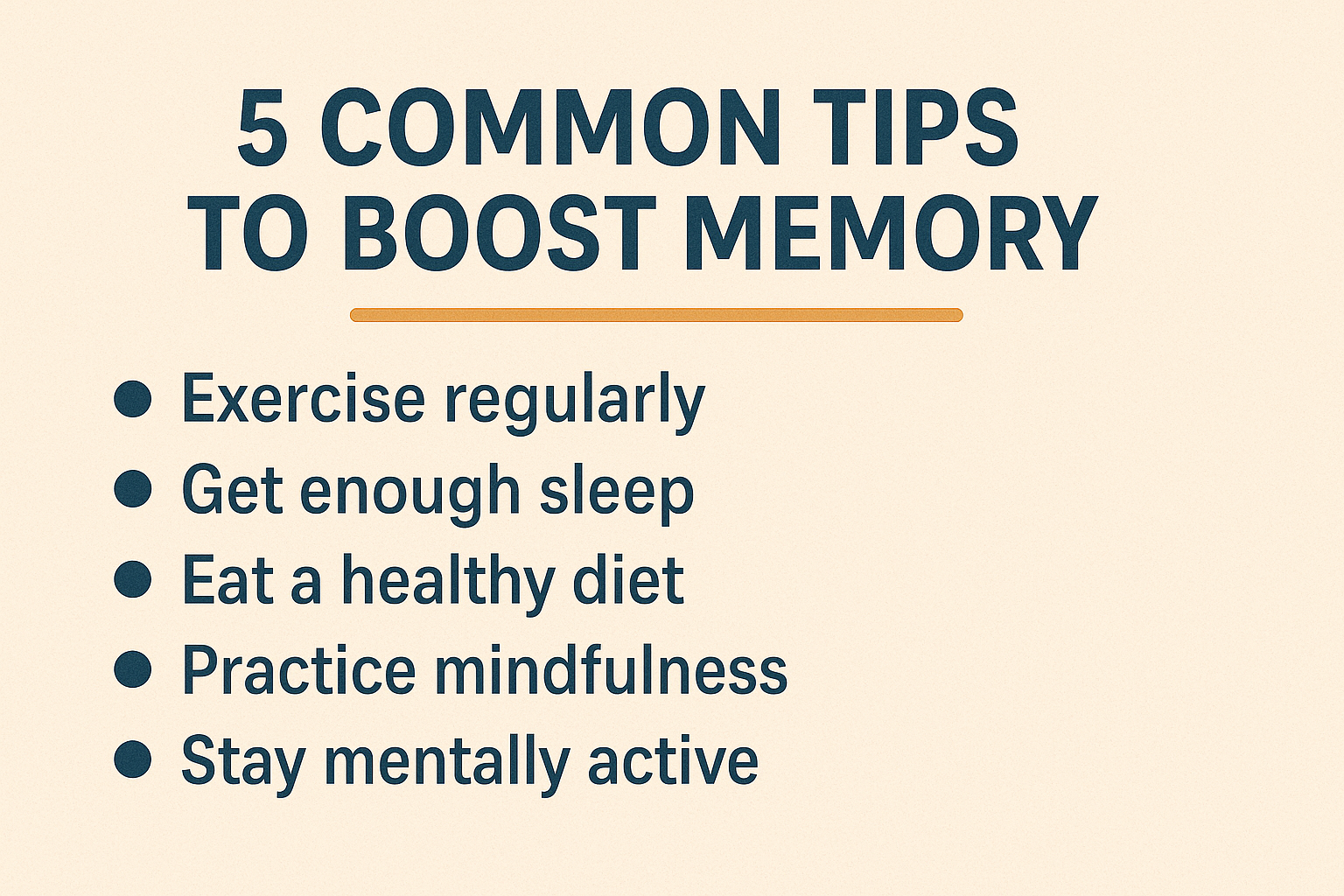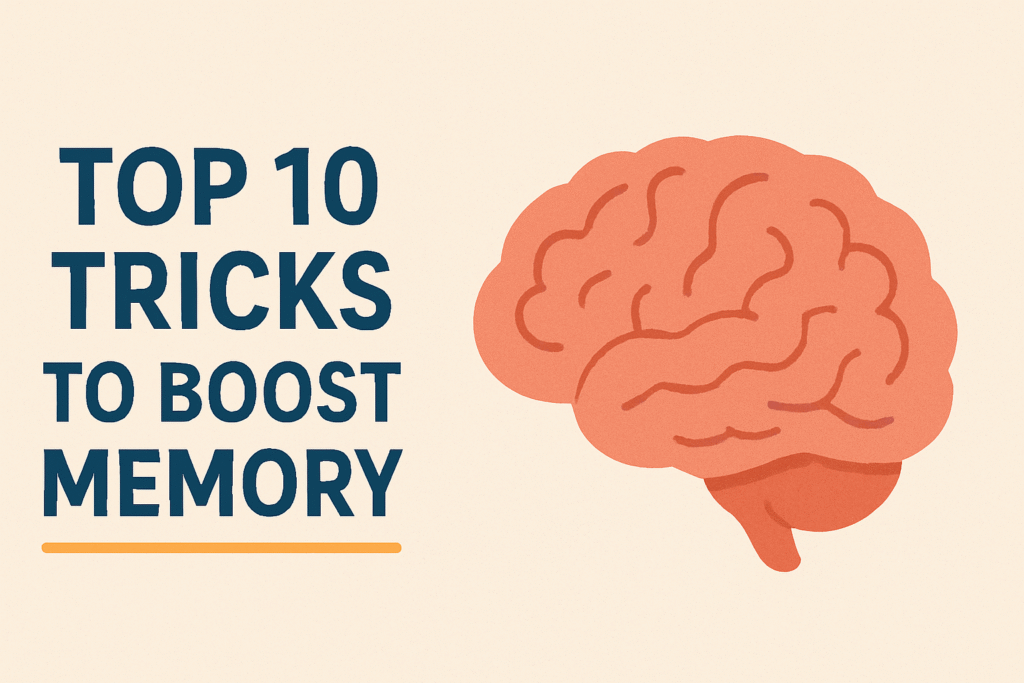Competitive exams like UPSC, NEET, JEE, SSC, or banking exams require not only hard work but also smart strategies – especially when it comes to memory. Retaining and recalling vast amount of information under a time constrain can be challenging. However, there are proven tricks and techniques that can significantly enhance your memory and improve your performance in these exams.
Here’s a comprehensive guide on top memory-boosting tricks tailored for competitive exam preparation:
Top 10 Tricks to Boost Memory for Examinations:
1. Use Mnemonics
Mnemonics are memory aids that help you retain complex information through catchy phrases, acronyms, or associations. They simplify learning by linking new concepts with familiar ones. These tricks are especially useful for subjects like biology, history, or general knowledge where rote memorization is required.
- Acronyms: For example, in the government ministry, AYUSH stands for Ministry of Ayurveda, Yoga & Naturopathy, Unani, Siddha, and Homoeopathy.
- Rhymes or songs: You can turn facts into a melody. Musical rhythm helps enhance memory retention.
- Visual Mnemonics: Associate a term with a vivid image in your mind.
2. Mind Mapping for Better Understanding
Mind maps are visual diagrams that represent relationships between concepts. They help in organizing information and enhancing memory through visualization. This method assists both left and right brain functions, increasing retention and creative thinking.
- Start with a central concept and branch out with keywords.
- Use colors, images, and symbols to make it more engaging.
- Ideal for subjects like polity, economics, or science, where multiple interlinked concepts are involved.
3. Spaced Repetition
Spaced repetition is one of the most effective memory techniques, backed by neuroscience. Instead of rote learning or cramming, review your notes at increasing intervals—1 day, 3 days, 7 days, and so on. Spaced repetition strengthens long-term memory and is essential for exams with a large syllabus.
- Use tools like Anki, Quizlet, or even a basic flashcard system.
- Focus on active recall: test yourself rather than just rereading notes.
4. Chunking: Grouping for Efficiency
Instead of trying to remember long strings of data, break them into smaller, manageable ‘chunks.’ Chunking reduces cognitive load and enhances memory efficiency.
- For example, to remember a number like 199520012023, chunk it as 1995 | 2001 | 2023.
- In language learning, group vocabulary into categories like animals, professions, or verbs.

5. Loci – Memory Place
Used by memory champions, this technique involves associating information with specific locations. It’s particularly helpful for remembering lists, sequences, or historical timelines.
- Imagine a familiar place (like your home) and assign facts to different locations in that place.
- During recall, mentally ‘walk through’ the space to retrieve information.
6. Teach What You Learn
This is known as the ‘Feynman Technique’. If you can explain a topic in simple language to someone else, you truly understand it. This technique reinforces concepts and uncovers areas that need more focus.
- After studying a topic, try to teach it to a friend, family member, or even yourself in front of a mirror.
- Identify gaps in your knowledge and fill them.
7. Eliminate Distractions and Focus Deeply
Multitasking is the enemy of deep memory formation. Focused attention helps in better encoding of information in long-term memory. To remember what you study:
- Use the ‘Pomodoro Technique’ (25 minutes of focused study followed by 5-minute breaks).
- Keep your study environment clutter-free and silent. Turn off notifications and avoid social media during study sessions.
8. Maintain a Healthy Lifestyle
Your brain performs best when your body is in a healthy state. Good health fuels better memory and reduces exam stress. Here are essential lifestyle tips that directly impact memory:
- Sleep: Aim for 7-8 hours of quality sleep. Memory consolidation happens during deep sleep.
- Exercise: Physical activity increases blood flow to the brain and enhances mental alertness.
- Nutrition: Eat memory-boosting foods like nuts, seeds, berries, eggs, and green leafy vegetables.
- Hydration: Dehydration can impair cognitive performance. Drink enough water throughout the day.

9. Use Associations and Storytelling
Link abstract or vague data with real-life examples or create stories around them. When information is emotionally engaging or imaginative, it sticks better in the mind.
- For example, to remember the Preamble of the Indian Constitution, you can craft a story involving a “sovereign character” seeking “justice, liberty, equality, and fraternity” in his kingdom.
10. Practice Regular Revision
Memory fades if not revised. A proper revision timetable is crucial. Consistent revision is the key to remembering a large amount of content till exam day.
- Revise weekly and monthly. Before bed, quickly go over what you learned during the day.
- Write summaries or diagrams from memory to reinforce content. You can recap by yourself.
Increasing your memory power is not about working harder—it’s about working smarter. By incorporating these smart tricks, tips and techniques like mnemonics, spaced repetition, mind mapping, and lifestyle changes, you can dramatically boost your ability to retain and recall information during competitive exams. Start small, stay consistent, and experiment with different methods to find what suits your style best. Remember: the brain, like a muscle, gets stronger with the right kind of training.
